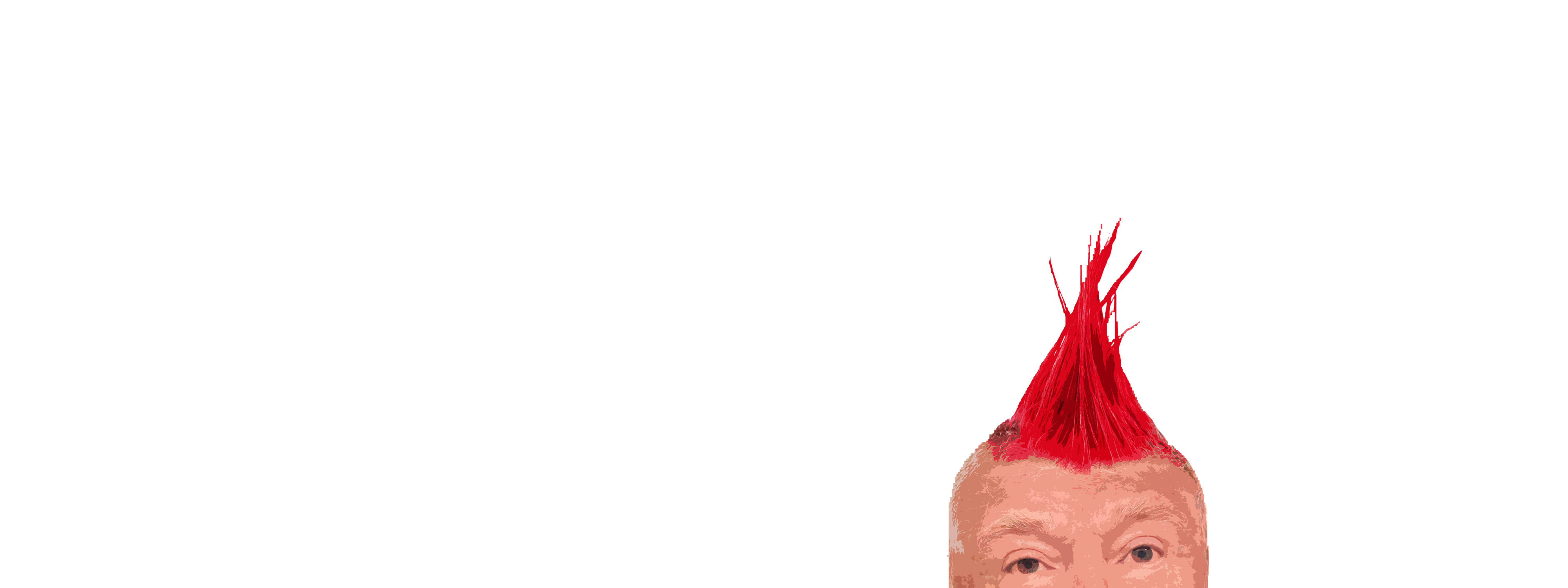Is Trumpism the new punk rock?
Amateurism, insurrection, transgressive appeal, a DIY ethos... Sound familiar?


A free daily email with the biggest news stories of the day – and the best features from TheWeek.com
You are now subscribed
Your newsletter sign-up was successful
A new quarterly journal that debuted last week proffered weighty philosophical answers to the question of what, idealistically, Trumpism might mean. The first issue of this journal, American Affairs, is replete with lofty references to Aristotle, Cicero, Aquinas, Locke, and Burke. A young Conservative Political Action Conference (CPAC) attendee, however, pointed in a different direction, much closer to Earth. He said he'd grown up a standard-issue George W. Bush conservative Republican, but had more recently migrated to the alt-right movement. One of its attractions, he said, was that it felt like "the new punk rock."
Now, depending on your inclination, such a characterization may confirm your suspicions about the controversy-courting characters who travel under the alt-right banner. The word "punk," to many, evokes images of angry hooligans and anarchic behavior. Then again, it may sound blasphemous: The memory of "punk rock," as it has been canonized in the upper echelons of rock criticism, is associated with left-wing anti-authoritarianism. Hence it would be ridiculous to call yourself "punk" while supporting a right-wing authoritarian like Trump.
I discussed this question with my friend and former editor Daniel Wattenberg, the author most recently of Decatur's Wake: The Fateful Rivalry Behind the Lightning Defeat of Barbary Terror. Wattenberg attended Columbia University in the late 1970s and bounced around the punk-rock scene of New York City in a variety of bands. His memories of the era and its freewheeling milieu informed a thoughtful essay for the Weekly Standard in 1996 that shed light on the unorthodox right-wing roots of punk rock.
The Week
Escape your echo chamber. Get the facts behind the news, plus analysis from multiple perspectives.

Sign up for The Week's Free Newsletters
From our morning news briefing to a weekly Good News Newsletter, get the best of The Week delivered directly to your inbox.
From our morning news briefing to a weekly Good News Newsletter, get the best of The Week delivered directly to your inbox.
Wattenberg rejects any association between punk rock the alt-right, racialism, or white identitarianism. Rather, he sees parallels between punk and Trumpism more broadly. "I have to say, it does feel similar in a lot of ways, psychologically and emotionally," he says.
The first thing one must understand about the right-wing character of punk, Wattenberg says, is not that its exponents were soi-disant Young Republicans, quoting Goldwater or God and Man at Yale. New York-centered punk began as "an intramural insurrection within the counterculture," he says. It was the punks vs. their somnolent, sententious hippie older brothers and sisters, who had for years propounded what Wattenberg calls the "reverse pieties" of anti-Americanism and anti-commercialism and white guilt.
What does this have to do with the president and his core following?
Wattenberg says Trumpism was "an insurrection against Conservatism Inc." — a political establishment that had become flabby, complacent, and self-indulgent in the same way that 1970s progressive rock music had grown bombastic, pretentious, and long-winded. Whereas Republicans before Trump had been terrified of deviating from orthodox positions on trade, the desirability of immigration, or the wisdom of the Iraq war, Trump thumbed his nose at this orthodoxy.
A free daily email with the biggest news stories of the day – and the best features from TheWeek.com
Then there's Trump's seeming amateurism — his "inexperience and rawness," Wattenberg says. Just as punks weren't trained musicians, Trump is frequently assailed for not playing politics the right way, that is, the professional way. When Wattenberg hears the media establishment pounce on Trump for falsehoods, misstatements, or exaggerations, he hears echoes of musical sophisticates belittling punk rock for its primitivism. Trump may get lost in the details, but he gets the big things attitudinally right. Put another way: He may know only three chords, but Wattenberg says his followers hear the "right three chords."
He also sees in Trump a political manifestation of punk's do-it-yourself (DIY) ethos. (By "do-it-yourself," punks don't mean changing the oil or remodeling your bathroom; it's meant as a command: Write your own song. Paint your own painting.) Punk-rock bands created their own independent labels and staged gigs in small clubs or church basements. Trump lacked support from Republican Party elites in the same way that punks lacked support from major labels and promoters. So he ran a shoestring campaign and made himself recklessly accessible to the media in pursuit of free coverage.
Finally there is the transgressive appeal of Trump's rejection of political correctness. Wattenberg says: "There's power in that. Punks were also occasionally misrepresented as harboring fascist sympathies. Once they call you a fascist, there's nothing more than they can say. That's the source of excitement Milo [Yiannopoulos] generated on campus: 'We're free again.' That's the thrill and the power of busting taboos."
Where does Trumpism lead, then? The legacy of punk rock can be looked at two ways. It could be seen as a musical movement that, outside of two bands (the potent, one-and-done Sex Pistols and the more creatively catholic Clash), ultimately didn't amount to much. Or it can be seen as a vital current that runs through subsequent movements from grunge to emo to more recent garage revivalists like the White Stripes.
Wattenberg, for his part, doesn't see Trumpism disappearing any time soon. "There are no longer any criteria of judgment independent of politics," he laments. For as long as the left gets to define the "permissible boundaries of expressive freedom," there will be some variant of Trumpism spoiling to defy it. And for as long as politics overspills into awards shows and sports pages and our personal social media, he adds, Trumpism will continue to appeal to those who want to escape its clutches.
It's enough to make you wanna be, well, sedated.
Scott Galupo is a freelance writer living in Virginia. In addition to The Week, he blogs for U.S. News and reviews live music for The Washington Post. He was formerly a senior contributor to the American Conservative and staff writer for The Washington Times. He was also an aide to Rep. John Boehner. He lives with his wife and two children and writes about politics to support his guitar habit.
-
 The week’s best photos
The week’s best photosIn Pictures An explosive meal, a carnival of joy, and more
-
 The ‘ravenous’ demand for Cornish minerals
The ‘ravenous’ demand for Cornish mineralsUnder the Radar Growing need for critical minerals to power tech has intensified ‘appetite’ for lithium, which could be a ‘huge boon’ for local economy
-
 Why are election experts taking Trump’s midterm threats seriously?
Why are election experts taking Trump’s midterm threats seriously?IN THE SPOTLIGHT As the president muses about polling place deployments and a centralized electoral system aimed at one-party control, lawmakers are taking this administration at its word
-
 The billionaires’ wealth tax: a catastrophe for California?
The billionaires’ wealth tax: a catastrophe for California?Talking Point Peter Thiel and Larry Page preparing to change state residency
-
 Bari Weiss’ ‘60 Minutes’ scandal is about more than one report
Bari Weiss’ ‘60 Minutes’ scandal is about more than one reportIN THE SPOTLIGHT By blocking an approved segment on a controversial prison holding US deportees in El Salvador, the editor-in-chief of CBS News has become the main story
-
 Has Zohran Mamdani shown the Democrats how to win again?
Has Zohran Mamdani shown the Democrats how to win again?Today’s Big Question New York City mayoral election touted as victory for left-wing populists but moderate centrist wins elsewhere present more complex path for Democratic Party
-
 Millions turn out for anti-Trump ‘No Kings’ rallies
Millions turn out for anti-Trump ‘No Kings’ ralliesSpeed Read An estimated 7 million people participated, 2 million more than at the first ‘No Kings’ protest in June
-
 Ghislaine Maxwell: angling for a Trump pardon
Ghislaine Maxwell: angling for a Trump pardonTalking Point Convicted sex trafficker's testimony could shed new light on president's links to Jeffrey Epstein
-
 The last words and final moments of 40 presidents
The last words and final moments of 40 presidentsThe Explainer Some are eloquent quotes worthy of the holders of the highest office in the nation, and others... aren't
-
 The JFK files: the truth at last?
The JFK files: the truth at last?In The Spotlight More than 64,000 previously classified documents relating the 1963 assassination of John F. Kennedy have been released by the Trump administration
-
 'Seriously, not literally': how should the world take Donald Trump?
'Seriously, not literally': how should the world take Donald Trump?Today's big question White House rhetoric and reality look likely to become increasingly blurred
